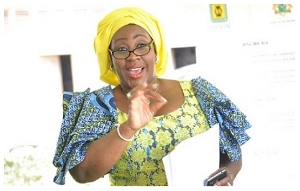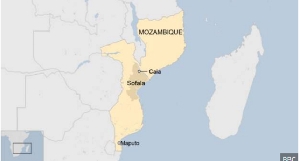- Home - News
- TWI News | TV
- Polls
- Year In Review
- News Archive
- Crime & Punishment
- Politics
- Regional
- Editorial
- Health
- Ghanaians Abroad
- Tabloid
- Africa
- Religion
- Election 2020
- Coronavirus
- News Videos | TV
- Photo Archives
- News Headlines
- Press Release
Opinions of Friday, 4 March 2011
Columnist: GNA
Ghana cannot develop by depriving women of education
A GNA feature by Fatima Anafu Astanga
Bolgatanga, March 4, GNA - From the cradle to the grave abound the evidence that the threshold to civilisation is carved by women who are educated and skilful to mode the society to the benchmark of excellence.
In an apparent endorsement of the need for women to have access to education and training to pursue this objective, Vice President John Dramani Mahama was quoted as saying that 93no nation can move on without emphasising on the education and emancipation of women". These were the words of wisdom by his Excellency when he addressed a speech and price giving day in the Western Region. There is a global acknowledgement that improving the state of women would bring more development not only to the world but to the families they belong to.
It is in this regard that a number of transformation have taken place to recognise the structure of the society and the re-evaluation of the relations between men and women.
Ghana's democratic experience has shown that giving the woman equal opportunity as her male counterpart has proved them worthy in promoting the image of the country.
US Secretary of State, Hilary Rodham Clinton said: 93There cannot be true democracy unless women are given the opportunity to take responsibility for their own lives."
However, the election of women into Parliament and the Metropolitan, Municipal and District Assemblies still come with many challenges despite the many calls to increase their participation in governance. The recent assembly elections saw a number of women loosing their seats. For instance, in the Eastern Region out of the 198 women who stood for the elections, only 75 were elected while in the Upper East Region only 49 women were elected from the 70 who contested. Despite these setbacks the education of women has paid the needed dividend. At least Ghana is proud to list the number of women playing important roles in all spheres of national life.
We have Professor Naana Opoku-Agyeman, first woman to be appointed Vice Chancellor of the University of Cape Coast, Professor Yaa Ntiamoah, Pro Vice Chancellor for Research, Innovation and Development with the University of Ghana who is also an Environmental Conservationist for Africa, and Chief Justice Mrs Georgina Theodora Wood, contributing immensely to the enhancement of the Judiciary. Ghana can also boast of Professor Afua Hesse, President of Medical Women's International Association, who made history by being the second woman for more than 90 years to head the association and Justice Joyce Adeline Bamford-Addo, Honourable Speaker of Parliament. Education holds the key to the success story of these women. Equal access to education, training and science and technology is therefore a prerequisite for better jobs for women and the guarantee of decent work.
Women can only get to where the society want them to be if resources are made available for them to improve on their academic status.
Society, in the past, stereotyped women only to be good for reproduction purposes. Women had their place in the kitchen whilst their male counterparts spent time to play around and expected their meals to be ready for them.
In the past boys had power over girls because it was claimed they were naturally more endowed with leadership instincts than girls. In so doing most girls were left behind and were not able to access formal education.
Girls were given out early for marriage, between the ages of 10 and 15 years, for dowry to pass on to the men in the family, as was the case of the Upper East Region, where men who wanted to marry but were unable to afford the dowry depended on their sisters' dowry. Other challenges girls go through during their development stages are inhuman cultural rites that infringe on their rights. At birth through to adolescence, some girls, depending on their culture go through puberty rites namely 93Dipo" in the Krobo area that expose their bodies.
In the north female genital mutilation is practice in some communities to 93reduce their sexual excitements etc". Women in the north go through widowhood rites that involve undressing them throughout the period. Some of the women during the performance of their husbands' funerals are asked to drink concoctions to proof their innocence, that they did not kill their spouses. The General Assembly declarations in 1948 reaffirmed that 93all human beings are born free and equal in dignity and rights", and that every one is entitled to all the rights and freedoms set forth by this declaration without distinction of any kind such as race colour, language, religion, birth or other status.
There is therefore the need for girls to enjoy their full potentials irrespective of the cultural and economic impediments. Government policy on education, free uniform and books is a clear example of efforts being made to ensure that all children, (boys and girls) alike go to school to guarantee a better future for them. The Ghana School Feeding Programme is a concept adopted since 2005 as a solution within the framework of the UN Millennium Development Goals endorsed by the New Partnership for Africa's Development to among other things promote, increase domestic food production, reduce hunger, improve school enrolment and ensure attendance and retention in deprived areas.
This initiative has been received with high enthusiasm by children and parents alike in the north where some pupils go to school for the whole day without food.
To complement the feeding programme, government has spent quality time and funds to construct more than 1,000 school buildings in its quest to remove the estimated 4,400 schools under trees in the country.
This is welcome news as it guarantees a sound environment for teaching and learning.
The attention given to deprived children in the distribution of free School uniforms, books and other teaching and learning materials to pupils cannot be over emphasised.
The government bursaries to girls offering science and technology courses is good, but there is also the need to address the falling standard of education in the junior and senior high schools to salvage the future leaders from the doom that awaits them.










